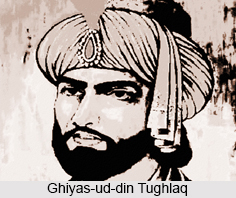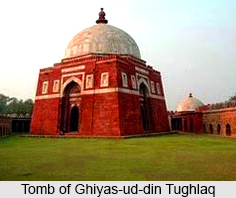 Ghiyas- ud- din Tughlaq laid down the foundation of a new dynasty known as the Tughlaq Dynasty. He was a Turkish slave of Sultan Balban and by serving the Sultans of Delhi, he rose to a higher position. He was appointed as the governor of Dipalpur by Ala- ud- din Khilji. Ghiyas- ud- din revolted against Khusra and killed him in the battle and became the Sultan in 1320A.D. Ghiyas- ud- din Tughlaq was succeeded by Muhammad bin Tughluq.
Ghiyas- ud- din Tughlaq laid down the foundation of a new dynasty known as the Tughlaq Dynasty. He was a Turkish slave of Sultan Balban and by serving the Sultans of Delhi, he rose to a higher position. He was appointed as the governor of Dipalpur by Ala- ud- din Khilji. Ghiyas- ud- din revolted against Khusra and killed him in the battle and became the Sultan in 1320A.D. Ghiyas- ud- din Tughlaq was succeeded by Muhammad bin Tughluq.
Personality of Ghiyas-ud-din
Ghiyas-ud-din followed the principles of Islam honestly and respected religious men and saints. His policies towards the Hindus were not liberal yet it was not that of oppression. He was a powerful commander and under his leadership, the army of Delhi Sultanate once more became effectively powerful and helped in the extension of the empire. Ghiyas-ud-din Tughlaq had faith in his own capabilities and tried to find out capabilities among others and use them for the benefit of the state.
Drawbacks in Ghiyas-ud-din"s Reign
Ghiyas-ud-din faced internal and external problems when he ascended the throne. The administrative set-up established by Ala-ud-din was destroyed by his successors and no steps were taken to establish a new one. The nobles and the courtiers had become negligent towards their responsibilities and engaged themselves in pleasures and entertainment. The Sultan had lost his prestige for both among the nobles and the subjects. Ghiyas-ud-din faced these hurdles with courage and succeeded in solving them.
 Ghiyas-ud-din"s Initiative for Improvement
Ghiyas-ud-din"s Initiative for Improvement
The first task of Ghiyas-ud-din was to strengthen his position on the throne and for that he tried to conciliate the nobles and the people. He pursued a policy of conciliation mixed up with sternness towards the nobles. Ghiyas-ud-din attempted to improve the finances of the state and for that purpose he pursued the policy of encouraging agriculture and protecting cultivators. His twin objects were to increase the land under cultivation and improve the economic condition of the farmers. The practice of measurement and survey of land which was adopted during the reign of Ala-ud-din was abandoned. Instead, the old system of sharing of the production was revived. He improved the means of irrigation and plant-many gardens.
Improvements by Ghiyas-ud-din
Ghiyas-ud-din improved the means of communication. Roads were repaired and improved. Bridges and canals were also constructed. He improved the postal system. The judicial system was also improvised by Ghiyas-ud-din. The practice of rigorous punishment and that of torture for extracting truth was generally prohibited. Ghiyas-ud-din was a capable military commander and was affectionate towards his soldiers. He looked after their welfare and paid them well. But he was a strict disciplinarian as well. Within two years after his accession, Ghiyas-ud-din succeeded in enhancing the strength of his army. Ghiyas-ud-din proved himself more aggressive imperialist than Ala-ud-din. He pursued the policy of annexation. He annexed the territories of all those rulers who were defeated by him. He captured Telingana, raided Jajnagar and conquered Bengal.
Ghiyas-ud-din conquered Bengal and a large part of South India and thus became the master of a more extensive empire than that of Ala-ud-din Khilji. Ghiyas-ud-din was successful as an administrator as well. He followed a middle path in administration which combined firmness with fairness. He established peace and order in the kingdom and thus saved it from the anarchy which prevailed after the death of Ala-ud-din. He rooted out dishonesty from the administration, looked after the happiness of peasants, increased the area under cultivation, improved means of communication, transport and postal system, constructed bridges and canals, developed gardens, increased the wages of his civil servants so that they might remain free from petty temptations, and restored the privileges and perquisites of his revenue officers.



















